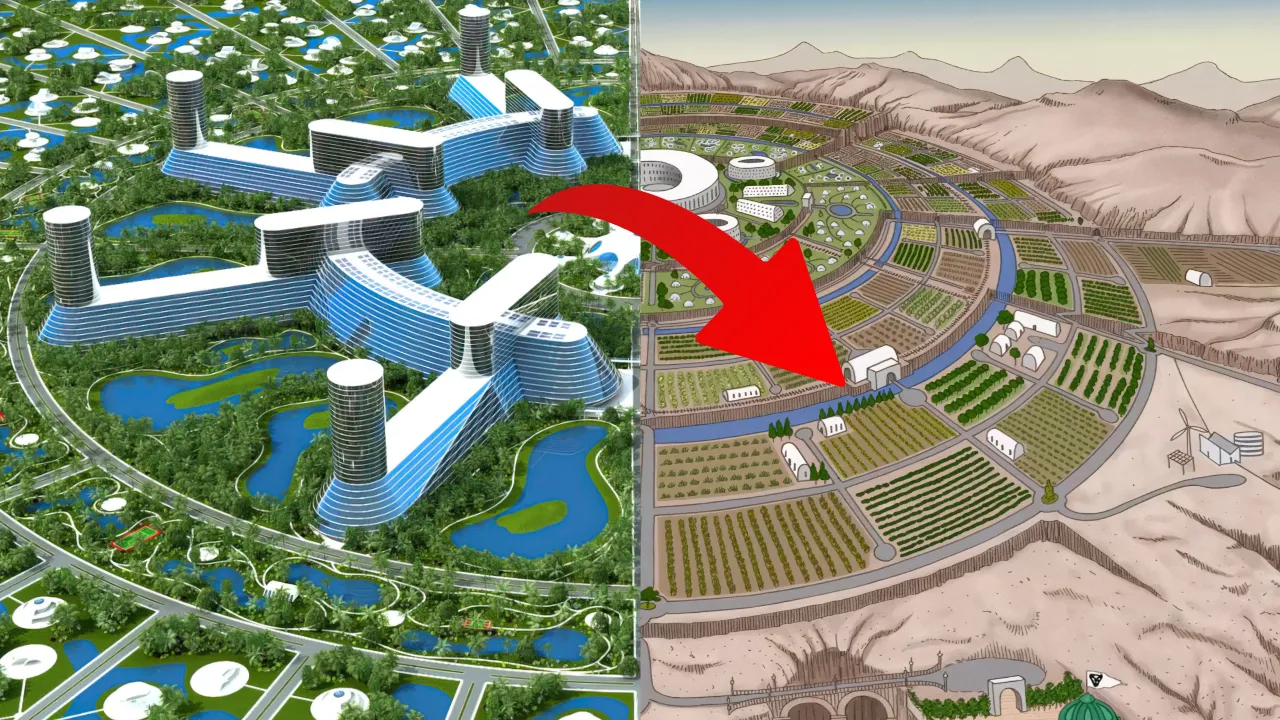A survivalist mining settlement in the desert where you work for free under the illusion of a city of the future. An institute studying pseudoscientific perpetual motion machines and aether energy as well as healers and shamanism as a substitute for modern medicine. A personal nuclear reactor in the heart of the city. The games of politics by a select group of “monks”: 40 philosophers that must come up with an ideal form of government by combining all known ones, including fascism. A plan to close for 10 years from civilization, with the name Jacques’ Rest, to enter a post-apocalyptic world with better offerings, become Arcadians, keepers of the knowledge, and rebuild civilization. – all this, and more, in The Venus Project’s new plans. Let’s review the basics one by one.
The Venus Project, since the death of Jacque Fresco and the appointment of a board of directors made up of former volunteers, has become an information citadel, with non-disclosure agreements, no news and no feedback. It became the perfect breeding ground for corruption and manipulation, the deliberate destruction of the movement, and of anyone who could freely express disagreement. In this brew pot, a wide variety of ideas and thoughts were digested and fostered behind the scenes. Nathanael Dinwiddie, living in The Venus Project’s guest house with Jacque Fresco’s colleague Roxanne Meadows next door for the past 9 years, did his best to introduce Roxanne to the new world of conspiracies, alternative scientists, and the survivalist subculture with books, podcasts, and the proper people. Information has begun to leak out to the public from the directors themselves and their new Jacque Fresco, Simon Michaux. Strange wording and goals are becoming clearer on The Venus Project’s completely revamped website.
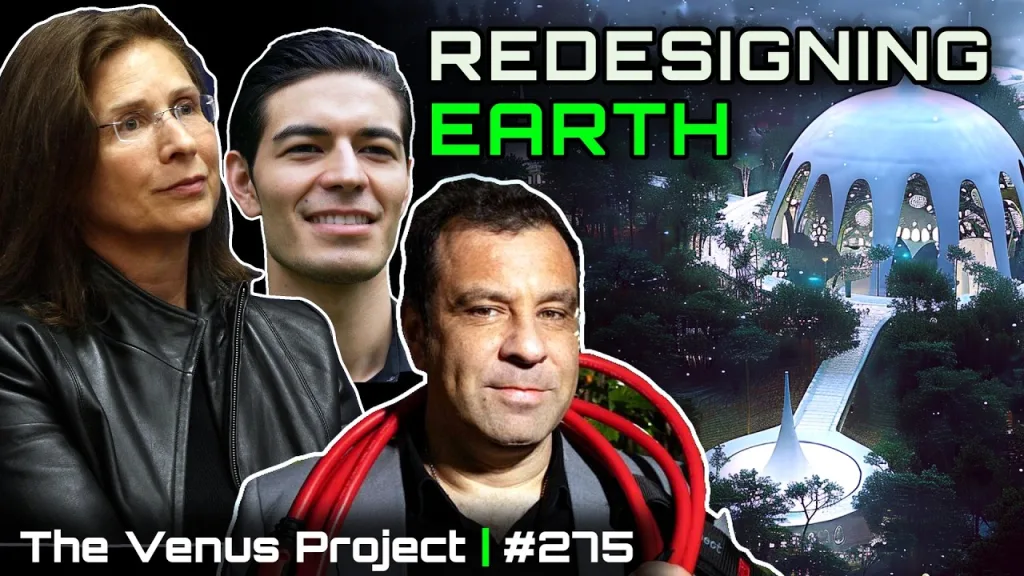
From the recently released “Building a State from scratch” podcast, we learn new details about the planned Venus Arantas city in the desert, and most notably, the political system is finally being addressed as well.
Quickly navigate through the table of contents:
- The Venus Project is playing politics (or religion)
- A mining settlement with traditional medicine
- The Prometheus Institute is a magnet for pseudoscientists and charlatans
- Money, culture, and your own anti-utopia novel
- Preparing for the apocalypse – a safe harbor in Peru
- Recycling tires and living in an eco-village
- A Thorium nuclear powered city in your crypto wallet
- Corporations and a devil’s contract
- What else is interesting from the podcast? Synopsis
- Bottom line
The Venus Project is playing politics (or religion)
The main governing body turns out to be meeting on “Game Theory Lab” where 40 scientists and philosophers will play (debate) for hours and days long about the optimal social order, fantasizing how you can live better taking the best of all social systems, including fascism, feudal system, etc.
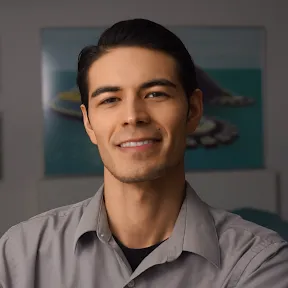
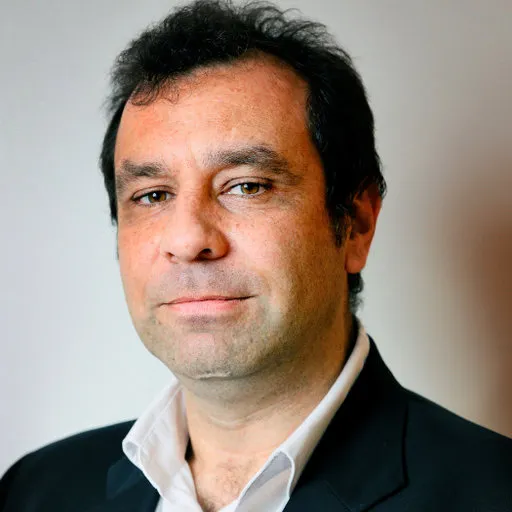
The Venus Project’s board of directors, Nate, Theo, a philosopher and a pilot, and Simon Michaux, a pseudo-scientist survivalist and conspiracy theorist. And judging from other podcasts, there could be some pretty odious personalities, pseudoscientists, and maybe even tribal shamans (I’m serious). They will make sure that the whole endeavor “doesn’t go the wrong way”, and will determine the way of life not only for the supposed 10.000 people that will live in Venus Arantas, but at the same time, not clear how, set the trend for the rest of the mankind.
What kind of political regime would it be if you have a certain ruling group, and everyone else separately? Feudalism with a nobility? A dictatorship with a ruling party? Or just an apocalyptic cult with all-knowing priests? (Nate stipulated that he would be a “monk” on this board).
I can’t recall any peaceful groups of people that have long existed, or ever existed, who play “let’s create our own state in an existing state”, except for religious communities, which are protected by laws – after all, they are the only ones who can make weirdo inner rules.
And then we find out that the introduced social order in the city can be changed (!) at any minute at the will of the members of “Game Theory Lab”, and if something fails – to roll back to purely corporate relations “employer-employee”, and then think what else to invent.
A mining settlement with traditional medicine
Well, it’s not exactly Jacque Fresco’s utopian, highly automated city. Utopia? No, what we have here is a harsh reality and a game of survival. And you’re going to have to get your hands dirty, both in the mine and in the field. Given the claims of technology rollback, and the specifics of the climate, with the need to desalinate water, it’s going to be a hell of a place.
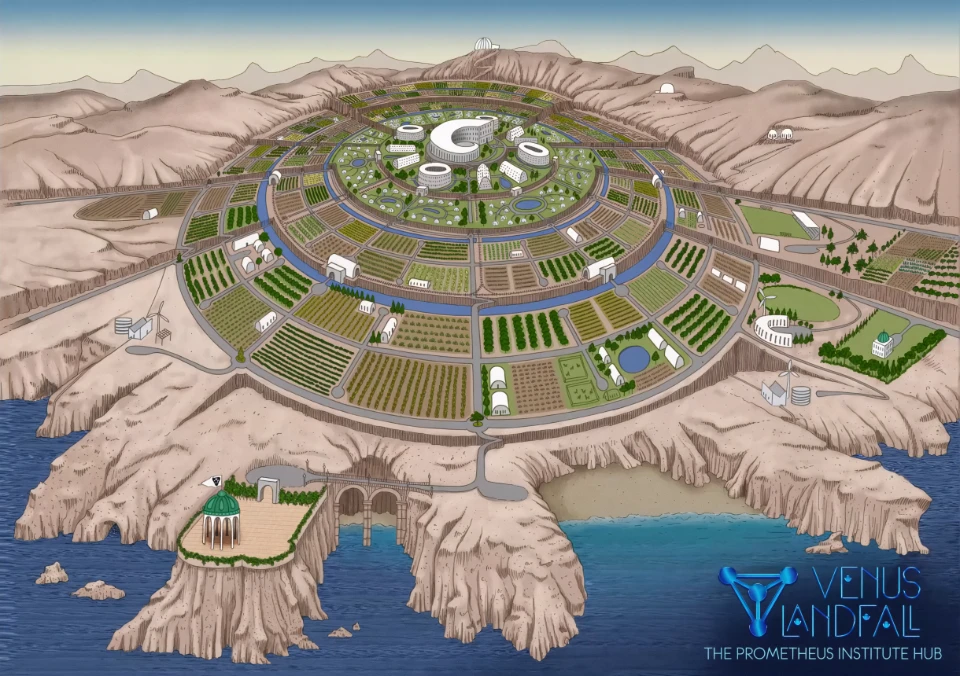
Having embellished with words from Jacque Fresco’s dictionary and high aspirations to save humanity, we will actually get a kind of mining settlement, a recycling station for used tires, an eco-village with garden plots in the desert and water desalination, and a testing ground where tests will be conducted, including tests on people, both socially and medically – and it is a pity that this topic is not touched upon. Perhaps on purpose. And after all, the medicine is a big part of the idea of this city. I saw this super-secret slide, and there are the same pseudo-scientific researches, but not of free energy, but in this case of medications, traditional healing remedies, energy healing, and methods dating back thousands of years – and you, it turns out, are just a lab guinea pig.
Simon’s quote from a podcast on AccidentalGods: “One of the segues, is this a school of thought that the modern pharmaceutical medicine can now no longer be trusted as an institution, as a science and everything like that. The whole thing will have to be reinvented, and this is going to make you laugh. Let’s go to South America and we’ll get Chinese herbal medicine to meet with the Amazon Shaman methods.”
The Prometheus Institute is a magnet for pseudoscientists and charlatans
An entire institute studying “non-conventional” energy sources will be the heart of this city. The disbelief in “official science” coupled with all the conspiracy theories that Simon Michaux, and apparently all the new directors of The Venus Project, believe in, has evolved into a hybrid of the scientific method with philosophy, New Age, to the new science, and the idea of retesting all the theories and technologies rejected by science, especially free energy and perpetual motion machines.
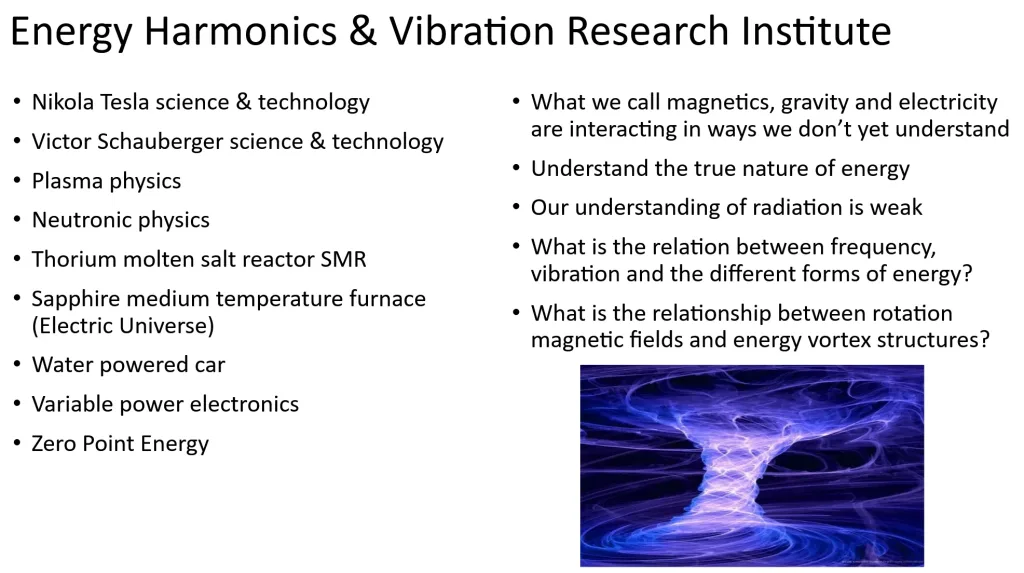
This is exactly what dozens of teams of “scientists” in the planned Prometheus Institute will be working tirelessly on. This topic deserves a separate article, partly already covered in notes from other podcasts by Simon Michaux.
But if we assume that it will be possible to find money for such a city, then one of the likely sources could be the interest of all kinds of charlatans with magic stones, perpetual motion machines and New Age methodologies, to have a place called a research center, conducting “independent research”. To loudly announce on websites, in videos and from the stage that there is “real science” confirming the efficacy of miracle pills and perpetual motion machines, and not the corporate-bought “official science” – and thereby collect even more money in exchange for feeding crap into the ears of gullible clients and followers.
They promise a multi-hour podcast on the Prometheus Institute coming soon. Can’t wait. Could you please mention on it about the same institute of unconventional medicine that will be standing right there nearby?
Money, culture, and your own anti-utopia novel
Money? What money? Remember, you’re working for an idea here. Simon had repeatedly mentioned that there would be no paychecks, at least not until some high level of profit reached and the investors had become satisfied with the return on investment. But it will be up to management to decide when they have enough to share the hard earned pennies with the workers. You signed up for a cashless society – work and don’t worry, give all the power to the 40 philosophers and don’t think about anything else, just work.
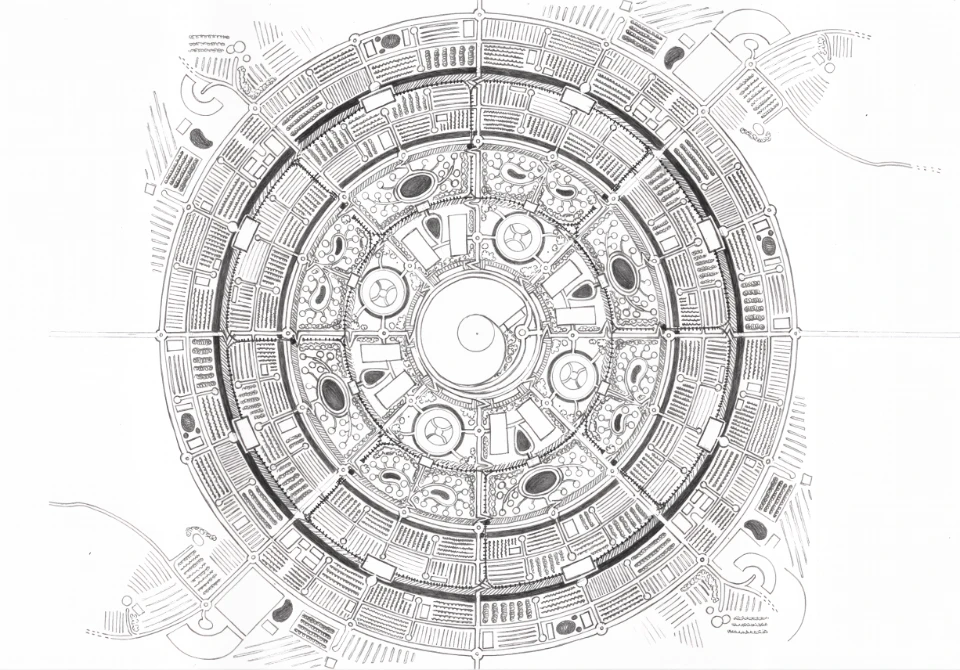
Let’s remember that the place was chosen far away from all civilization. Getting somewhere in urgent need will be a challenge, leaving all the cultural life and connection to civilization behind. The developers want to compete with corporations, but remember what Google offices look like and the conditions in which their employees work.
Medicine, dental care, safe childbirth, education, music concerts, hobby clubs, entertainment – leave those things in a former life. Maybe the internet will be allowed there, but I can’t guarantee that. How long can you keep people in such conditions if you don’t brainwash them properly all the time? For example, that the rest of the world is on fire, or is about to be destroyed, and the workers are very lucky to be here – they are the chosen few, to rebuild the entire human civilization. All in all, it’s not going to be easy! The plot is well wrapped up, you can start writing up your own Peruvian dystopia novel.
Preparing for the apocalypse – a safe harbor in Peru
You might have somehow thought what a strange place was chosen for a city: it’s not at all suitable for a starting point, it’s not supportive of agriculture, nuclear power testing, it’s very far and expensive to get to, all civilization is not close either, shipping is expensive, earthquakes, tsunamis, social instability in the region, crime, droughts, the vast empty Andean mountain ridge, etc….
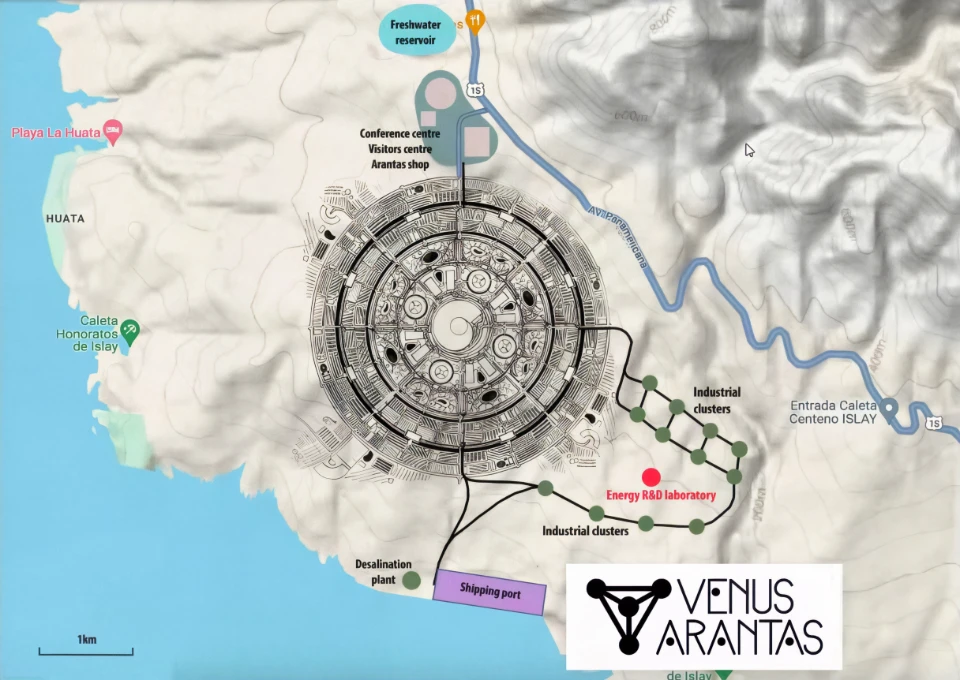
Metacrisis and Polycrisis, dear ladies and gentlemen. You’ve been told about it all over, maybe you haven’t been paying attention. It’s on every podcast, it’s all over The Venus Project’s updated website, everything is in preparation for the end of humanity as we know it in about 10 years. The few will remain, and the cities will turn into scenes from The Walking Dead with the scavengers who survive. Simon and company want to close down in a city from the rest of the world for 10 years, calling it ” Jacques’ Rest” mentioned on several of Simon’s past podcasts, and then go out into the world with a better offer. Having to be outliving that particular apocalypse. Just imagine what will happen inside a locked down city for all those 10 years and what will be told to the residents to keep them in the city.
According to the legend, laced with every possible conspiracy you’ve probably heard of, corporations are hiding the fact that oil has 8 years left, and without it there will be collapse, and, along with global warming, all hope for renewable energy generation will evaporate when it turns out that corporations have been lying to us about the efficacy of wind and solar power. This is according to Simon Michaux, and The Venus Project’s directors repeatedly refer to such literature, and even recommend it now on their website instead of the Jacque Fresco recommended reading.
This topic has been dropped a couple times on this podcast, perhaps because it doesn’t fit the format. But on other podcasts Simon has spoken quite explicitly about this place and its true purpose. And they called themselves the Arcadians, the guardians of the knowledge, the rebuilders of all civilization.
According to Simon, the place is easy to defend, and militarized guards and other points of defense – he does not undertake to discuss publicly, but they are “working hard on them”. Actually, it’s not a new topic for the preppers (survivalist) community, that at all times wait for the global ending under various reasons, but for a person from the outside it can be quite discouraging, that’s why this topic is omitted in many interviews, although it is the only logical explanation for the choice of the place.
Simon has covered this in a number of other podcasts – here are the notes from 5 of those podcasts gathered separately here, if you’re interested.
Recycling tires and living in an eco-village
Another source of income and goods for the city. But has anyone thought about what it’s like to live next to a mine and processing plants? What’s the point if you want to be one with nature, in harmony, but at the same time, you choose the dirtiest jobs, which will obviously affect your health.
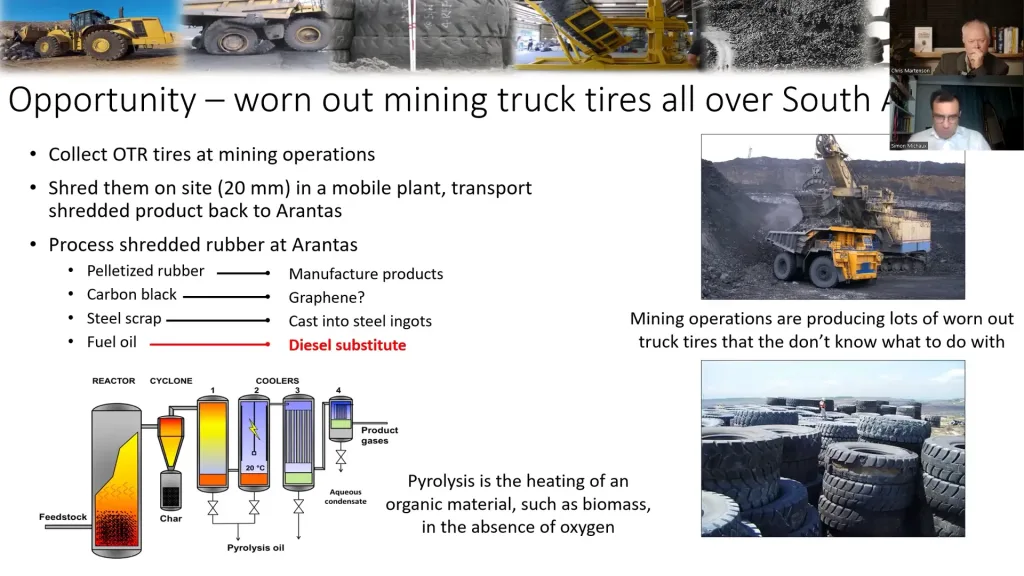
You should think twice about how such a community would be better than the blooming gardens of the local eco-village, in more viable latitudes, whose inhabitants are not subjected to all sorts of experiments. In an ordinary eco-village, everything is as simple and clear as a rake that you will use to plow a vegetable patch. And you don’t even need to build anything – there are thousands of them. Choose the most successful ones that are closer to you ideologically/spiritually, and go forward. You will be free to make jokes around the campfire, sing songs, be able to visit your relatives at a reasonable distance, have some money in your pocket, have influence in the village decision making, and you can always change your priorities in life and easily move to a new job in a neighboring city or a state without risking anything.
A Thorium nuclear powered city in your crypto wallet
The centerpiece of the city of Venus Arantas, the thorium nuclear reactor, is mentioned everywhere. “We’ll put up a tent and next to it a thorium reactor” is how Simon Michaux sees the beginning of this settlement, even before the mine and the tire recycling.
Is it worth mentioning that everything related to nuclear power is subject to the most severe procedures of inspections, approvals and permits at the highest level? The region where the city of Venus Arantas is planned is a rocky area where earthquakes are not rare, even 7-8 magnitude, and tsunamis are not uncommon. The question to ask: will a bunch of ideological people, philosophers, be allowed to build their eco-village with a nuclear reactor in such a region?
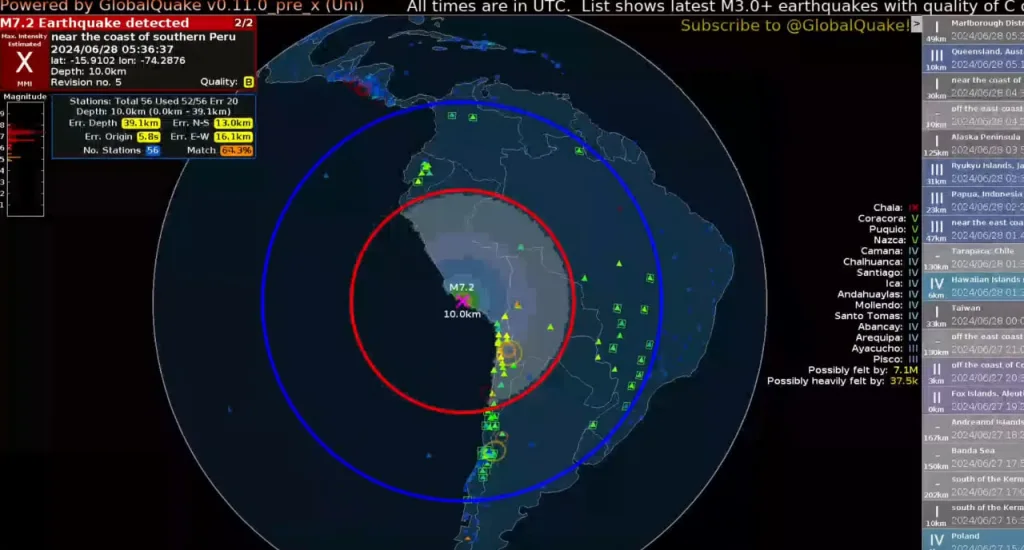
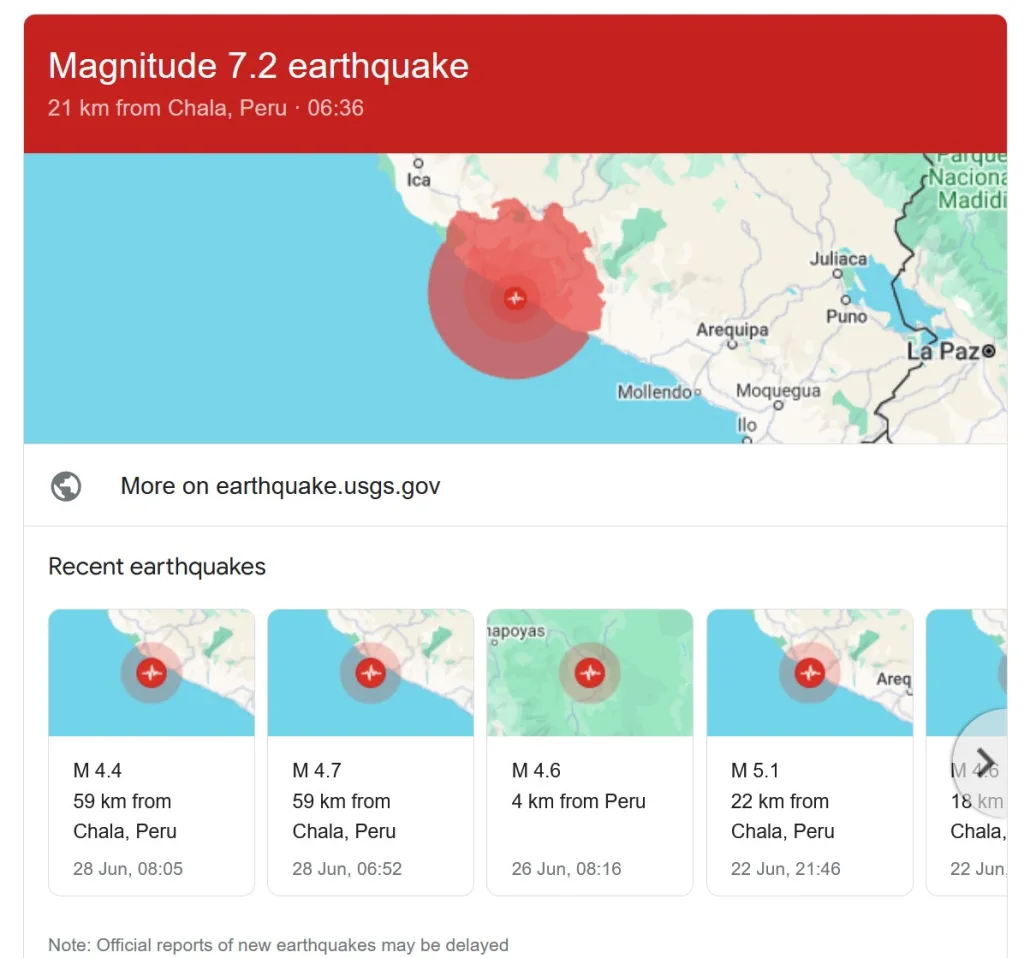
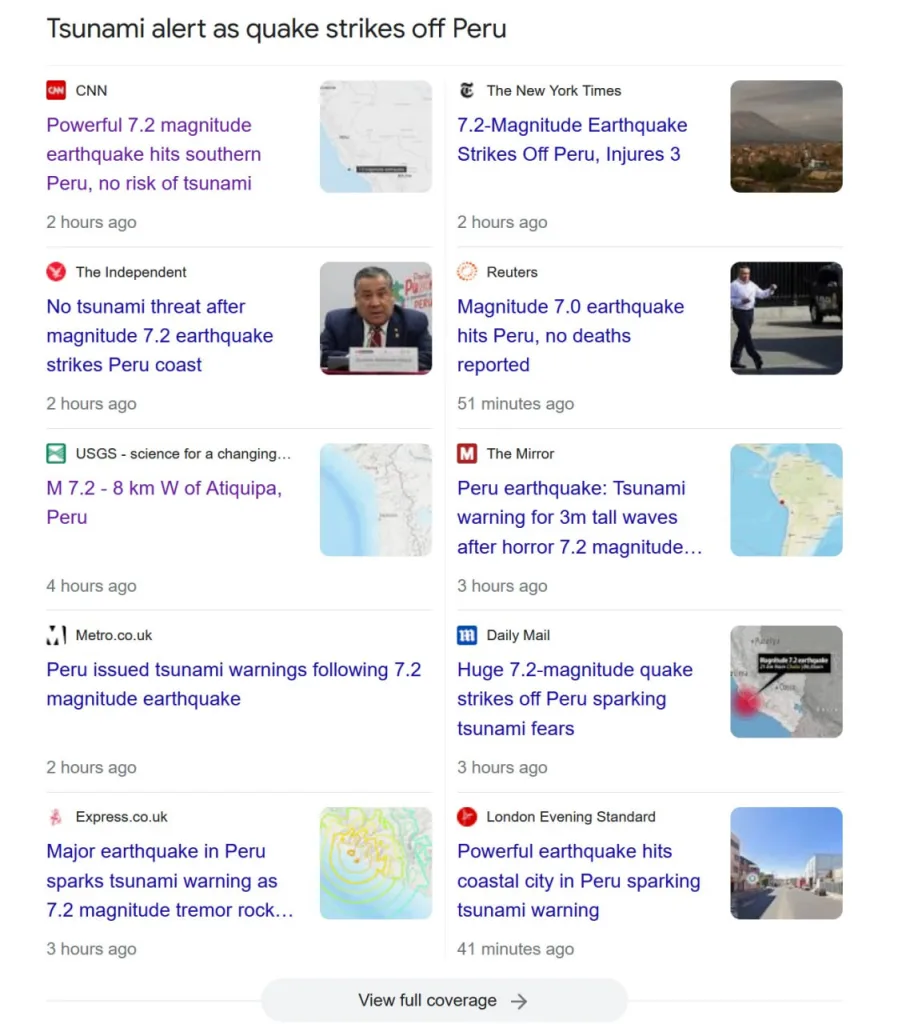
It took about 5-10 years for real countries like China to get approval for the first test load of a thorium reactor that is still in development, a real thorium reactor. And we haven’t talked about the fact that this technology simply doesn’t exist for anyone but laboratories, that they are still developing it – there is no finished product. We don’t see countries ordering reactors, even for the distant future, but The Venus Project, along with Simon Michaux, are already planning crowdfunding for this project.
And if it were actually feasible, and the technology was sufficiently developed – imagine a number of countries and corporations waiting for a scarce supply of cheap energy. What number in that queue would Simon Michaux and The Venus Project’s board of directors be? Will they set up their initial camp tent 50-100 years from now? Will the developer be eager to prioritize sending his reactors to a region with earthquakes, corruption, and high crime to people with questionable reputations whose podcasts get a few thousand views? One accident and a loud headline about the accident and the queue will be significantly reduced.
This whole thorium reactor thing is very speculative. And, please pay attention, the issue is not the technology itself, although you will be moved to this angle if you try to argue.
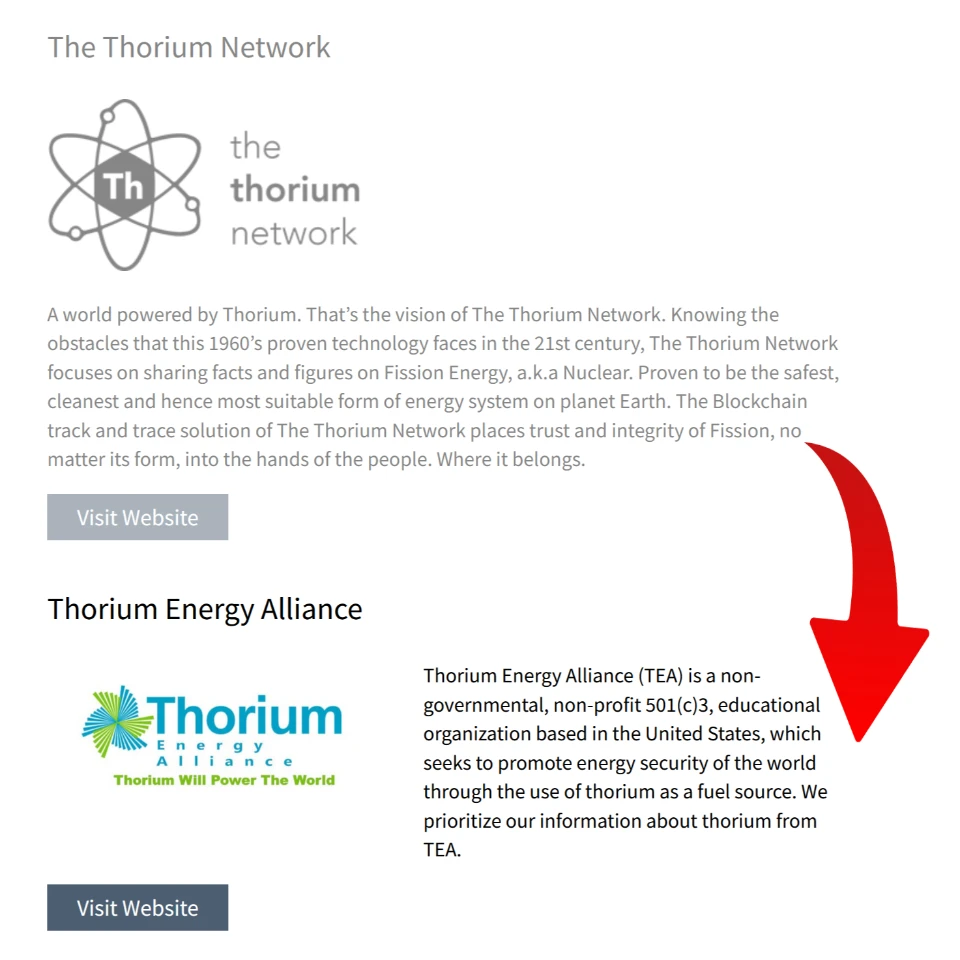
The Venus Project’s secret partner, The Thorium Network, which was recently listed as a partner on The Venus Project’s website, is pushing thorium reactors as if they were already on the market and greedy corporations were hiding them from us.
I did a whole study on The Thorium Network and its director, Jeremiah Josey, as part of a larger investigation, “The Venus Project’s End”, in a nutshell – they are a bunch of fraudsters, with a fake biography of an oil director, dummy companies shut down by the courts every few years, scammed investors, creating cryptocurrency bullshit coins with fake stories and promises: supposedly based on gold and thorium resources.
Jeremiah chose thorium as the key topic, and like a real info gypsy, he is hooked into the topic, broadcasting all possible news and fakes on this part, making up his own stories. He has a fictional company with millions of dollars in turnover. He even finds real researchers and scientists, fooling them with loud slogans, a story about his company being oppressed by corporations, and the presence of other like minded scientists in the citations. The real, few scientists, serve as a perfect image for the new investors in “promising technologies” and the next cryptocurrency.
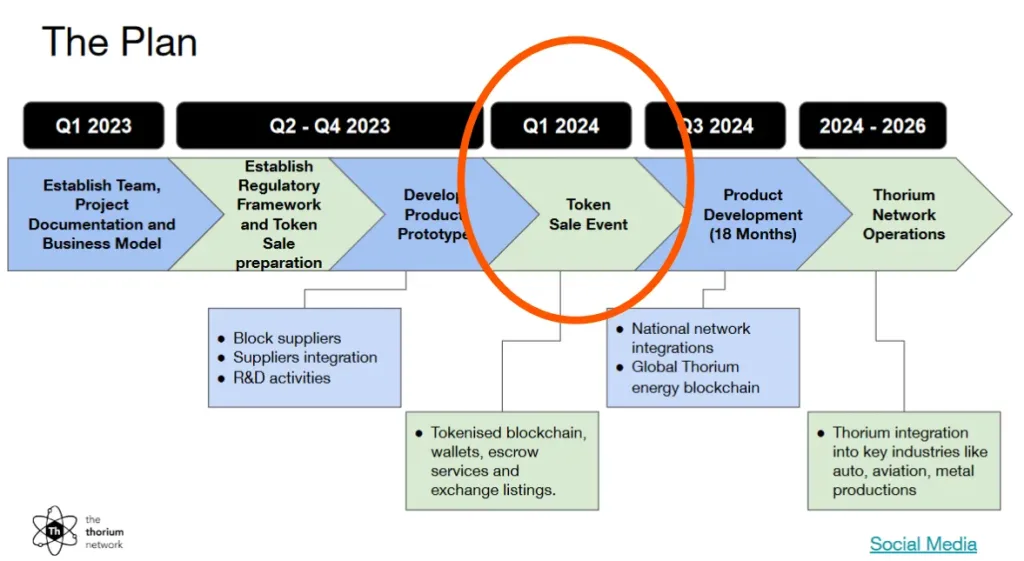
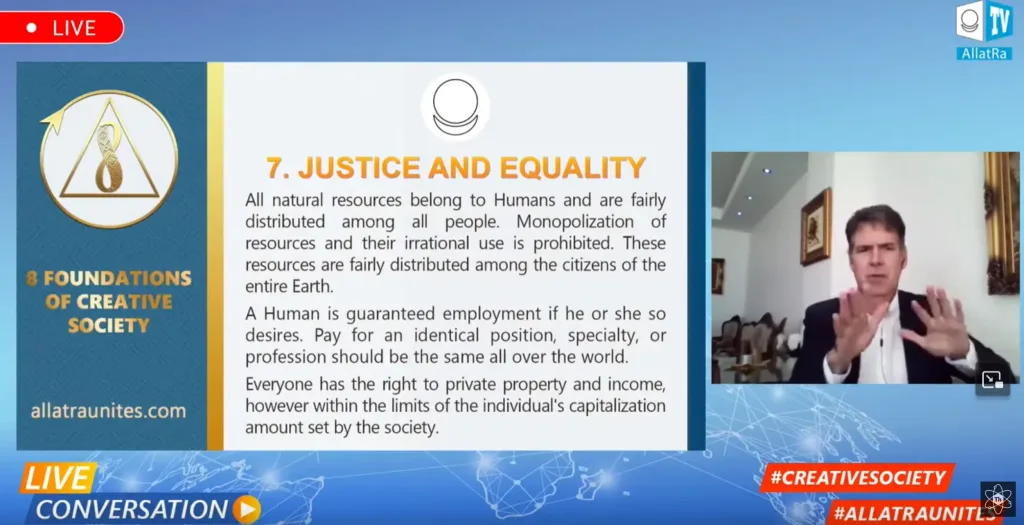
It was Jeremiah Josey who promised to organize the thorium reactors, the financing, the land in Peru where they plan to build. And although, after our investigations, this partnership is being tried to hide it in every way possible – for example, by replacing the partners in the block with a real organization with an almost identical name – this persona is not so easily taken out of the equation. Either Roxanne Meadows, the original head of The Venus Project, still believes him, or the whole company is starting to play a fraudulent game, mimicking Jeremiah Jossey’s cheating ways, except it’s not a one-day firm that’s at risk, and they’re not moving to another country to escape angry investors and the courts.
Corporations and a devil’s contract
Corporations supposedly obstructed Jacque Fresco, corporations are hiding unfavorable technologies, conspiring around the switch to renewable sources, and lying to us about the efficiency of solar panels and wind power (all from the same words of the new The Venus Project team led by Simon Michaux). Corporations are even drawing up the plans for new types of cities, and will dictate how you live! “You won’t own anything, but you’ll be happy” – No way! We’ll create our own mini corporation, a mining city, with money from investors, and we’ll be the ones to tell you how to live!
Do you know what you’re signing up for? By reposting, auto-liking, or donating to The Venus Project of Nathanael Dinwiddie and Simon Michaux. Where is there even a hint of connection to Jacque Fresco’s proposals or approach? This time, Nate gave an extensive presentation on the life and work of Jacque Fresco to emphasize that Jacque’s ideas are outdated, and that the ones giving them “evolution” are self-proclaimed adopters Nathanael Dinwiddie and Simon Michaux.
If you just fantasize about the fact that it was possible to realize such a city – what can it look like in reality, not in your rainbow perception and associations? What is really behind generalized slogans, streamlined formulations and promises?
How seriously can one take all this when even simple projects like the Jacque Fresco Foundation website, Jacque Fresco lecture transcripts, Major Motion Picture announced as completed and launched, have been non-functional for years? And much smaller amounts of $220,000, $110,000 in crowdfunding, not backed up by the promised realization of The Venus Project three times out of four?
What else is interesting from the podcast? Synopsis
The podcast was planned to be a conversation format, and this was a separate cut-in added by the interviewer, with a suggestion to skip ahead about an hour or so. But Nate had prepared a lengthy presentation on Jacque with an excursus into his biography, trying each time to make a ghostly connection to what they were doing now, drawing parallels that weren’t obvious.
It started with Jacque Fresco in order to legalize themselves, to show continuity, and it does not matter that the case itself does not relate to Jacque. This is done in order to bring the established audience and all the resources, generally everything that has been gathered and developed through Jacque Fresco, into a new endeavor, the “Evolution of Venus”. In this part, Nate compares past movements of techno-optimism about a better future, etc., but as it turns out, corporations have taken over the world, shifting the focus to a dystopian future, and Fresco simply continued to carry on that old, “no longer relevant”, vision from the early 20th century.
Nate reports that Jacques’ inventions were rejected, suppressing the emergence of certain technologies – “this is where you’ll see that our case with Simon is about the same thing” – referring to the Prometheus Institute for Energy Sources, which was rejected by science, as well as Simon’s research, which was not accepted by the scientific community. Jacque Fresco was upsetting corporations with his inventions, the example of prefabricated houses made of aluminum being cited.
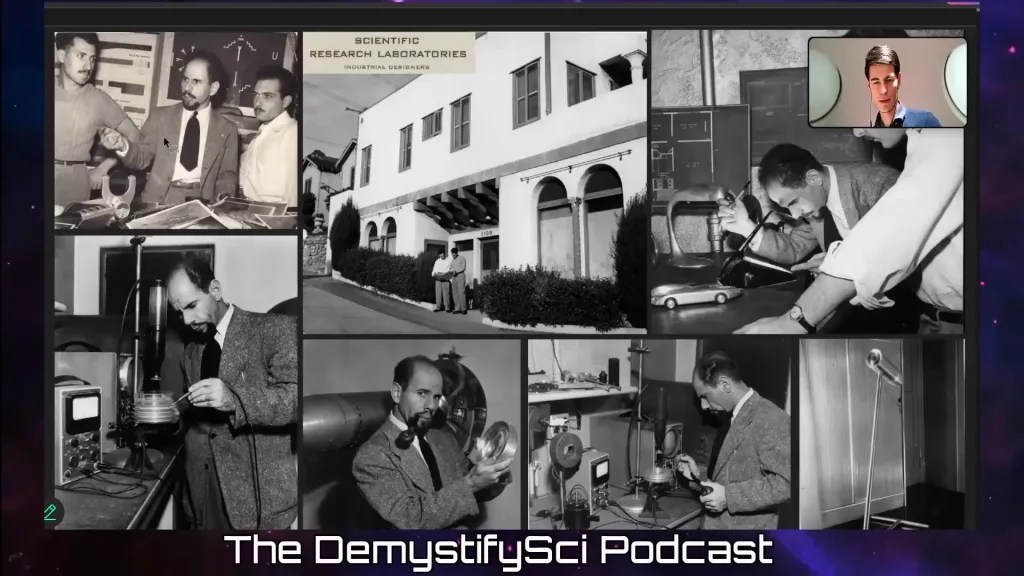
Roxanne Meadows: “I want to show you how Simon Michaux fits into all of this, and how it relates to the coming Metacrisis!” and further… “Some of the Board of Directors (and who else but Nate) have been diligently researching the reasons why we’re in this tight situation” – and essentially digging more and more into the prepper (survivalist) community and literature, and the Degrowth Movement – which is how they found Simon. “We saw that Simon had done a lot of research on the lack of resources for the green energy transition”
- We won’t focus on this “research” for now, just to let you know that for 3 years of its existence it has never received positive reviews, it has not been published in scientific journals, but it has received well-justified criticism from real scientists in the field, and there are directly opposite peer-reviewed studies. Oh, and since Simon did what Jacque didn’t – counted all the planet’s resources – Simon is in charge now.
Nate: “The green transition won’t work – it’s too late. We found Simon, who was ahead of everyone else with his research. We had to stop further looking for options because of Simon Michaux’s research, and Simon was already familiar with The Venus Project.” “Now we have the concept of The Venus Project Evolution – to adapt what Jacque Fresco was saying to the limitations that we have.” “Jacque was asked how to get to the realization, he kind of gave a couple of ideas, but Simon came up with a better solution.”
Simon: “We’ll set up a camp far away from civilization, make a mining camp, and then it will grow into an industrial mine and organize a city around it.” “The philosophy of Degrowth Movement is a very useful one.” “I’m combining the paradigms of Degrowth + circular economy + permaculture + elements of very old technologies”
“In 2008 I saw the Zeitgeist movie and it was the coolest thing I’d ever seen, but at the time I was learning about growth limits and didn’t understand how to achieve it” – Simon was living in a survivalist community in Australia preparing for the apocalypse and promoting the same ideas, and now he’s written himself a 1000 page ‘research’ that he refers to all the time. “…The Venus Project was lacking in steps to realization, but now I can give that realization, and do it in the right way!”.
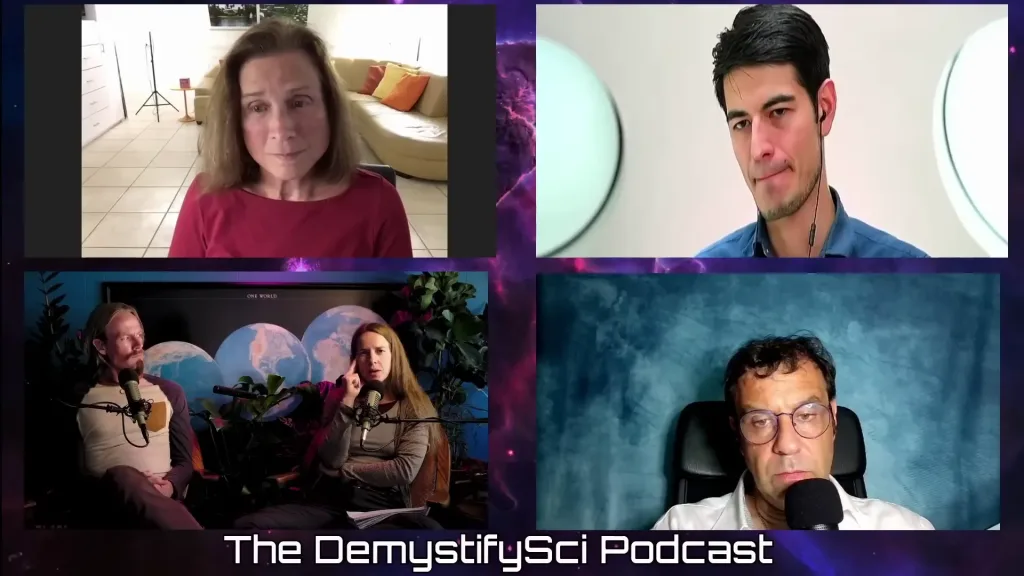
“We’re going to build a city of 10,000 people. It will take 1-3 billion dollars” – other podcasts have quoted both 5 and 10 billion dollars, and it seems like the number is just pulled from nothing. “…the settlement itself will cost 800 million or 1-2 billion.”
Sources of funding: Grassroots funding – mobilizing local budgets and people (good luck in Peru). “We will attract capital. There are people that would like to be associated with the progress we will propose.” “We may have a different problem, that we get too much money too fast.” “The second type of investor – they want a return on investment.” “Industrial permaculture.” “We take used tires and recycle them into diesel, and we also make different other things from local materials.” “Everyone is working, getting everything they need, after a while we’ll give a paycheck so they can travel out.”
The hosts asked how many people are working on this right now? Our heroes got off topic – in fact there are several people: three people from The Venus Project’s board of directors, Simon Michaux and Jeremiah Josey. There are a few more volunteers who don’t know what they’re doing, and it turns out they’re not working on this project – they’ve been left with an aquaponic greenhouse project in India to keep them busy, and the volunteers have organized a discussion club, meeting once a week, pretending to be working on something important.
Simon: we’ll pitch a tent and put a thorium reactor next to it and it will change the world. “Hippie communes didn’t last long together, but there are some good communes – like the Amish” and a couple others, clearly religious, they’re being held up as an example. What a good example.
The Game Theory Laboratory, wanted to be headed by Viktor Sheuberger – there will be 40 people of scientists and philosophers that will discuss and imagine how we should all live better.
3-4 office buildings, there will be residential buildings all around, and then factories and fields. “It’s going to be a little mining town.”
“We are not looking for new -isms” – but here they lie, as they did not give any alternative to the political system, except that they tried to camouflage their political system in some way. “A community of enlightened individuals.”
The interviewee is from Chechnya, and worries that whenever someone proposes something utopian, it turns into a dictatorship like Stalinism and similar systems.
“What kind of social contract is gonna allow a sustainable existence? One visionary person leads a project, then they step away and the social contract collapses.” – If ours collapses, Simon says, we’ll roll back simply to a state of “we’re a company and we have some work to do.”
Nate: there’s tension in many groups since Jacques’ death, and we’re trying to bring them together, to explain what we’re doing. (Yes, of course, and the main tool is total silence, closure, non-disclosure agreements, making threats and logical manipulations in the few announcements we’ve had)
“A research institute for 2,000 scientists, engineers, etc.”
There was a good question from the hosts – who would want to stay there, what about personal life, activities, culture, etc.? What is available only in big cities, what do those who got out far away suffer from. – They were unable to answer in any meaningful way.
“The Hype Cycle” is what Nate calls the period of The Venus Project’s popularity and the development of movements based on it.
Roxanne: The movement was great, inspiring – but we now need different kind of people to make it happen.
Nate: Metacrisis dictates everything.
Roxanne: The city will be dedicated to the survival of human civilization. We should strive to make sure it doesn’t go back to where we started… (she was interrupted in her response)
Nate: We want to be advisors – members of the board of directors. Our job is to be monks… (the answer was cut off at this point, because Nate was starting to give out more than necessary).
Michaux: We’re gonna have a university later. Nate wants to build a library.
Toward the end, Simon read from a sheet of paper: “This is an evolution of The Venus Project powered by an unorthodox but mature energy source operating to a new resources management paradigm. We are proposing to develop a way with a more responsible relationship with a planetary environment and a new paradigm in social contract and how we might live. We will construct a technology innovation hub in an unconventional city to the purpose of developing a new energy, a new raw materials and a new manufacture paradigm operated by a more socially mature kind of society.”
Bottom line
Well, you can draw your own conclusions. I tried to quote directly what I heard here or on other podcasts. I didn’t make that up, but you can hear it from the main heroes of this article. The Venus Project was previously associated with the scientific method, the evolution of society to a moneyless society through the creation of high-tech automated cities, social design and the unlocking of each person’s potential, the automation of all boring and dangerous jobs, the dramatic reduction of crime and the abandonment of the political system, a global focus on improving the lives of all mankind and, as a result, ending wars and conflicts, and many other things that resonated with millions of people around the world.
It’s a shame that such great ideas have fallen into the wrong hands, hands that are burying both the ideas themselves and their reputation under layers of pseudoscience, conspiracies, and even public manipulation and outright fraud. Which is something we’ve partially succeeded in putting on hold – after all, the million-dollar crowdfunding for this city was promised back in December 2023, planned to be about to go live in the coming week, in conjunction with the launch of the cryptocurrency on Thorium. At the very least, the disruption of this big hoax is already being considered an accomplishment for us.
It’s still not clear how to promote Jacque Fresco’s original ideas and work towards their realization when the materials, names and everything worked on for decades have ended up in the ownership of a few people who no longer see any point in them except to squeeze all the juices in the crudest and most dishonest way into their new endeavor.
Please share this article with friends and on social media, and consider signing up for sponsorship or making a one-time contribution to support our project – this will allow us to continue working to promote and realize Jacque Fresco’s original ideas.
Thank you!
Up next…
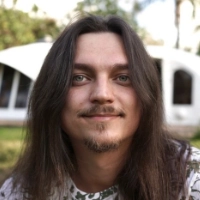
I have been at the center of all this dirrection for over 13 years and can tell you a lot of things, from detailed explanation of Jacque Fresco’s original proposals, to experience of working with the movement, to little known and insider information.
I have organized the most successful and effective team of The Venus Project movement, now represented by Designing The Future, as well as the 1.5 million subscriber Jacque Fresco channel, small and large events, radio and TV interviews, working with universities and schools, organizing events, running a network of groups in 60 cities with regular meetings, and much more. Exposed and fought fraudulent companies and initiatives to protect The Venus Project’s reputation.
Organized and negotiated the construction of The Venus Project’s smart city, with the then living Jacque Fresco, which was their best chance. This has now evolved into a full-fledged smart city project and test site for the development of the entire industry of smart cities, called “Mission on Earth”, which will be launched soon, late 2024-early 2025, and we’re directly involved.
After the new directors of The Venus Project changed course, I strongly opposed it without hesitation, especially knowing the details of the gamble – taking the side of Jacque Fresco’s original ideas. Whatever the outcomes, I will continue what I have started, with the goal of giving humanity a chance to move toward a resource-based economy, or at least to point society in the right direction. I hope you will join us.

